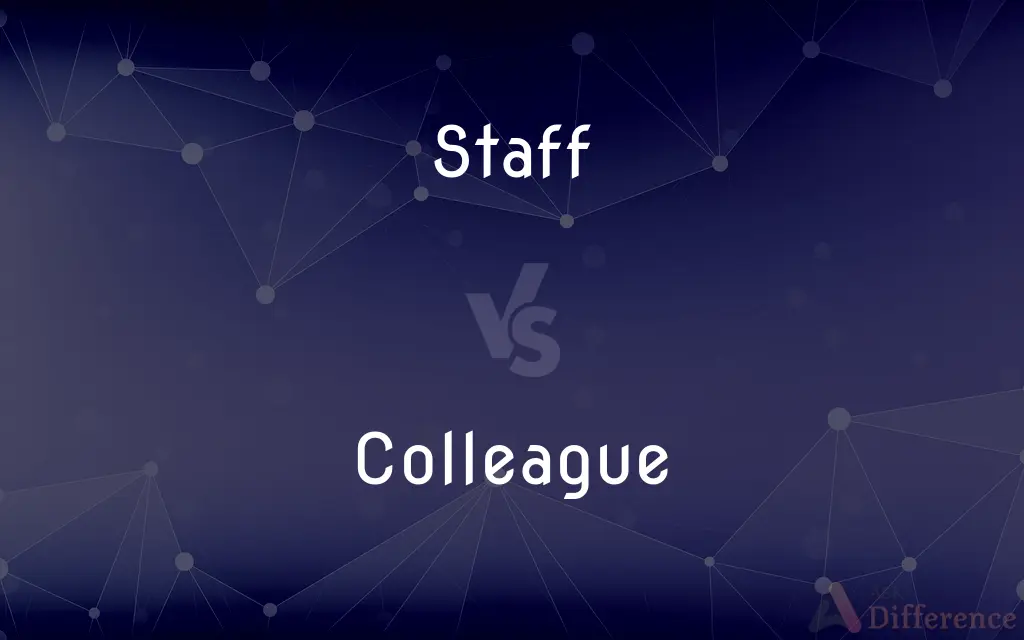Staff vs. Colleague — What's the Difference?
By Urooj Arif & Fiza Rafique — Updated on April 3, 2024
Staff refers to all employees of an organization, while a colleague is an individual who works with others within the same profession or organization.

Difference Between Staff and Colleague
Table of Contents
ADVERTISEMENT
Key Differences
Staff encompasses the entire workforce of an organization, including everyone from entry-level employees to senior management. It's a collective term that represents the group of individuals employed by a company or institution. Staff members can have vastly different roles, responsibilities, and levels of seniority, but they all contribute to the organization's objectives. On the other hand, a colleague is a more specific term referring to an individual who works in the same organization, department, or professional field as another person. Colleagues may work closely together on projects or tasks and often share a similar professional background or area of expertise.
The concept of staff emphasizes the structure and workforce of an organization as a whole, highlighting the collaborative effort of multiple people working towards a common goal. In contrast, the term colleague focuses on the interpersonal relationship between workers who may share tasks, goals, or work environments. While all colleagues can be considered staff, not all staff members might directly work together or even know each other, depending on the size and scope of the organization.
Staff is a term that also implies a sense of belonging to an organization, indicating the people who are on the payroll and contribute to the organizational operations. It encompasses a wide range of job functions, responsibilities, and levels within the hierarchy of a company. Whereas colleagues refer to a more personal and direct relationship between individuals who are likely to interact with each other regularly due to their work assignments or professional responsibilities.
Understanding the distinction between staff and colleagues is essential in the workplace for clear communication. For instance, when referring to company-wide policies or announcements, the term staff would be more appropriate to encompass all employees. However, when discussing collaboration, support, or interactions within a team or department, referring to individuals as colleagues highlights the cooperative and interpersonal aspects of working together.
Despite the differences, both terms underline the importance of people in the workplace. The concept of staff underscores the collective workforce and its contribution to the organization's success, while colleagues emphasize the significance of professional relationships and teamwork in achieving common objectives.
ADVERTISEMENT
Comparison Chart
Definition
Collective term for all employees of an organization.
Individual working in the same organization, department, or profession.
Scope
Organization-wide, including all levels of employment.
More specific to individuals who work directly with one another.
Focus
The entire workforce and organizational structure.
Interpersonal relationships and professional interaction.
Relationship
Defines an employment relationship with the organization.
Describes a working relationship between individuals.
Usage
Used to refer to the collective employees of an organization.
Used to describe a more personal connection between workers.
Compare with Definitions
Staff
All employees working within an organization.
The staff meeting is scheduled for Monday morning.
Colleague
Someone working in the same department or field.
My colleagues in the marketing department are incredibly creative.
Staff
The collective workforce of a company.
The company's staff includes both part-time and full-time employees.
Colleague
Individuals sharing a common work goal.
Colleagues collaborated on the new initiative.
Staff
Individuals on the payroll.
Staff benefits include health insurance and annual leave.
Colleague
A fellow worker within the same organization.
I'll consult with my colleagues before finalizing the report.
Staff
Represents a range of roles and responsibilities.
The staff at the hospital ranges from surgeons to administrative assistants.
Colleague
Describes a more direct working relationship.
He thanked his colleagues for their support during the conference.
Staff
The body of workers contributing to an organization.
Staff training sessions are held quarterly.
Colleague
Peers within a professional setting.
She sought advice from her colleagues on the project.
Staff
A stick or cane carried as an aid in walking or climbing.
Colleague
A fellow member of a profession, staff, or academic faculty; an associate.
Staff
A stout stick used as a weapon; a cudgel.
Colleague
A fellow member of a profession, staff, academic faculty or other organization; an associate.
Staff
A pole on which a flag is displayed; a flagstaff.
Colleague
To unite or associate with another or with others.
Young Fortinbras,/ Holding a weak supposal of our worth/...Colleagued with the dream of his advantage,/...hath not failed to pester us with message/ Importing the surrender of those lands/Lost by his father. - Hamlet (Act I, Scene 2)
Staff
A rod or baton carried as a symbol of authority.
Colleague
A partner or associate in some civil or ecclesiastical office or employment. It is never used of partners in trade or manufactures.
Staff
Pl. staffs A rule or similar graduated stick used for testing or measuring, as in surveying.
Colleague
To unite or associate with another or with others.
Staff
A group of assistants to a manager, executive, or other person in authority.
Colleague
An associate you work with
Staff
A group of military officers assigned to assist a commanding officer in an executive or advisory capacity.
Colleague
A person who is member of your class or profession;
The surgeon consulted his colleagues
He sent e-mail to his fellow hackers
Staff
The personnel who carry out a specific enterprise
The nursing staff of a hospital.
Staff
Something that serves as a staple or support.
Staff
(Music) A set of horizontal lines and intermediate spaces used in notation to represent a sequence of pitches, in modern notation normally consisting of five lines and four spaces. Also called stave.
Staff
A building material of plaster and fiber used as an exterior wall covering of temporary buildings, as at expositions.
Staff
To provide with a staff of workers or assistants.
Staff
To serve on the staff of (an organization).
Staff
A long, straight, thick wooden rod or stick, especially one used to assist in walking.
Staff
A series of horizontal lines on which musical notes are written; a stave.
Staff
The employees of a business.
The company employed 10 new members of staff this month.
The company has taken on 1600 more highly-paid staff.
Staff
(uncountable) A mixture of plaster and fibre used as a temporary exterior wall covering.W
Staff
A pole, stick, or wand borne as an ensign of authority; a badge of office.
A constable's staff
Staff
A pole upon which a flag is supported and displayed.
Staff
(archaic) The rung of a ladder.
Staff
A series of verses so disposed that, when it is concluded, the same order begins again; a stanza; a stave.
Staff
(engineering) An arbor, as of a wheel or a pinion of a watch.
Staff
(surgery) The grooved director for the gorget, or knife, used in cutting for stone in the bladder.
Staff
(military) An establishment of officers in various departments attached to an army, to a section of an army, or to the commander of an army. The general's staff consists of those officers about his person who are employed in carrying his commands into execution.
Staff
A form of token once used, in combination with a ticket, for safe train movements between two points on a single line.
Staff
(transitive) To supply (a business, volunteer organization, etc.) with employees or staff members.
Staff
A long piece of wood; a stick; the long handle of an instrument or weapon; a pole or stick, used for many purposes; as, a surveyor's staff; the staff of a spear or pike.
And he put the staves into the rings on the sides of the altar to bear it withal.
With forks and staves the felon to pursue.
Staff
A stick carried in the hand for support or defense by a person walking; hence, a support; that which props or upholds.
The boy was the very staff of my age.
He spoke of it [beer] in "The Earnest Cry," and likewise in the "Scotch Drink," as one of the staffs of life which had been struck from the poor man's hand.
Staff
A pole, stick, or wand borne as an ensign of authority; a badge of office; as, a constable's staff.
Methought this staff, mine office badge in court,Was broke in twain.
All his officers brake their staves; but at their return new staves were delivered unto them.
Staff
A pole upon which a flag is supported and displayed.
Staff
The round of a ladder.
I ascended at one [ladder] of six hundred and thirty-nine staves.
Staff
A series of verses so disposed that, when it is concluded, the same order begins again; a stanza; a stave.
Cowley found out that no kind of staff is proper for an heroic poem, as being all too lyrical.
Staff
The five lines and the spaces on which music is written; - formerly called stave.
Staff
An arbor, as of a wheel or a pinion of a watch.
Staff
The grooved director for the gorget, or knife, used in cutting for stone in the bladder.
Staff
An establishment of officers in various departments attached to an army, to a section of an army, or to the commander of an army. The general's staff consists of those officers about his person who are employed in carrying his commands into execution. See État Major.
Staff
Hence: A body of assistants serving to carry into effect the plans of a superintendent or manager; sometimes used for the entire group of employees of an enterprise, excluding the top management; as, the staff of a newspaper.
Staff
Plaster combined with fibrous and other materials so as to be suitable for sculpture in relief or in the round, or for forming flat plates or boards of considerable size which can be nailed to framework to make the exterior of a larger structure, forming joints which may afterward be repaired and concealed with fresh plaster.
Staff
Personnel who assist their superior in carrying out an assigned task;
The hospital has an excellent nursing staff
The general relied on his staff to make routine decisions
Staff
The body of teachers and administrators at a school;
The dean addressed the letter to the entire staff of the university
Staff
A strong rod or stick with a specialized utilitarian purpose;
He walked with the help of a wooden staff
Staff
Building material consisting of plaster and hair; used to cover external surfaces of temporary structure (as at an exposition) or for decoration
Staff
A rod carried as a symbol
Staff
(music) the system of five horizontal lines on which the musical notes are written
Staff
Provide with staff;
This position is not always staffed
Staff
Serve on the staff of;
The two men staff the reception desk
Common Curiosities
Can a colleague be outside of my department?
Yes, a colleague can work in a different department but within the same organization.
What makes someone a staff member?
Being employed by and working for an organization makes someone a staff member.
Is there a difference in the level of formality between 'staff' and 'colleague'?
"Staff" is more formal and collective, while "colleague" implies a closer, more personal working relationship.
Can the term 'staff' refer to a single person?
Typically, "staff" refers to a group of employees rather than an individual.
How do staff members interact with colleagues?
Staff members interact with colleagues through collaboration, communication, and support in shared tasks or projects.
What role do colleagues play in the workplace?
Colleagues play a crucial role in fostering teamwork, collaboration, and a supportive work environment.
Are temporary workers considered staff?
Yes, temporary workers are considered part of the staff for the duration of their employment.
Why is it important to distinguish between staff and colleagues?
Distinguishing between the two helps clarify communication regarding organizational policies versus interpersonal interactions.
How does one become a staff member?
One becomes a staff member by being hired to work for an organization.
Do all colleagues have the same rank?
Not necessarily; colleagues can have different ranks but work together on projects or within the same department.
Can volunteers be considered staff or colleagues?
Volunteers can be considered part of the staff in a broad sense and colleagues if they work directly with other paid employees.
How do staff dynamics affect productivity?
Positive staff dynamics, characterized by effective communication and collaboration among colleagues, can significantly boost productivity.
Is it possible to have colleagues in a remote work setting?
Yes, individuals can have colleagues in a remote work setting, collaborating and interacting through digital means.
How does the concept of staff relate to organizational culture?
The concept of staff reflects the collective identity and values of the organization, influencing its culture.
What impact does a good relationship with colleagues have on job satisfaction?
A good relationship with colleagues can greatly enhance job satisfaction by creating a more supportive and enjoyable work environment.
Share Your Discovery

Previous Comparison
Miss vs. Mrs
Next Comparison
Function vs. ProcedureAuthor Spotlight
Written by
Urooj ArifUrooj is a skilled content writer at Ask Difference, known for her exceptional ability to simplify complex topics into engaging and informative content. With a passion for research and a flair for clear, concise writing, she consistently delivers articles that resonate with our diverse audience.
Co-written by
Fiza RafiqueFiza Rafique is a skilled content writer at AskDifference.com, where she meticulously refines and enhances written pieces. Drawing from her vast editorial expertise, Fiza ensures clarity, accuracy, and precision in every article. Passionate about language, she continually seeks to elevate the quality of content for readers worldwide.














































